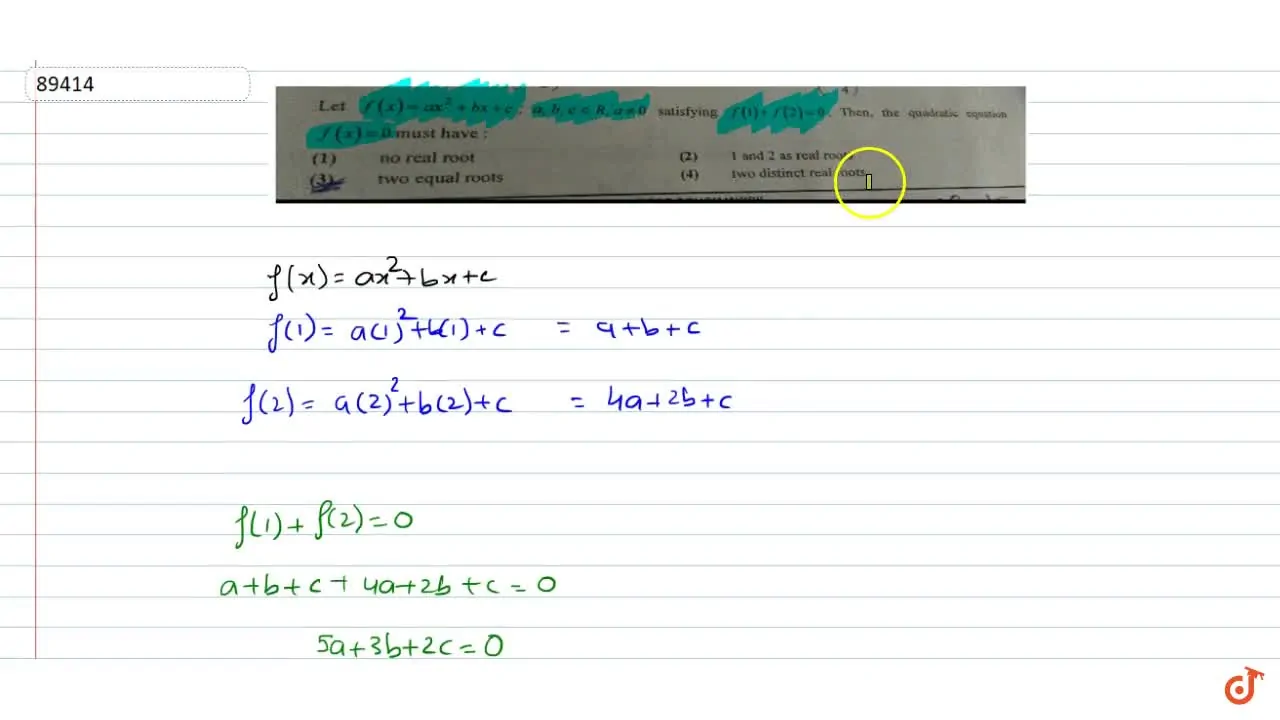Let f(x)=ax2+bx+c∀a,b,c∈R,a≠0 satisfying f(1)+f(2)=0. Then, the quadratic equation f(x)=0 must have :
no real root
1 and 2 as real roots
two equal roots
two distinct real roots
The correct Answer is:D
We have, f(x)=ax2+bx+c
∴ f(1)+f(2)=0⇒5a+3b+2c−0
Let D be the discriminant of f(x) = 0. Then,
D=b2−4ac
⇒ D=(5a+2c−3)2−4ac [Using (i)]
⇒ D=(5a+2c)2−36ac9
⇒ D=25a2+4c2−16ac9=19{(4a−2c)2+9a2}>0
Hence, f(x) = 0 has two distinct real roots.
Related Playlists
- BOOK - OBJECTIVE RD SHARMACHAPTER - QUADRATIC EXPRESSIONS AND EQUATIONS EXERCISE - Section II - Assertion Reason Type22videos
QUADRATIC EXPRESSIONS AND EQUATIONS
- BOOK - OBJECTIVE RD SHARMACHAPTER - QUADRATIC EXPRESSIONS AND EQUATIONS EXERCISE - Exercise138videos
QUADRATIC EXPRESSIONS AND EQUATIONS
- BOOK - OBJECTIVE RD SHARMACHAPTER - QUADRATIC EXPRESSIONS AND EQUATIONS EXERCISE - Chapter Test50videos
QUADRATIC EXPRESSIONS AND EQUATIONS
- BOOK - OBJECTIVE RD SHARMACHAPTER - PROBABILITY EXERCISE - Chapter Test45videos
PROBABILITY
- BOOK - OBJECTIVE RD SHARMACHAPTER - SEQUENCES AND SERIESEXERCISE - Chapter Test60videos
SEQUENCES AND SERIES
Similar Questions
Let f(x)=x2+ax+b,a,b∈R, If f(1)+f(2)+f(3)=0, then the roots of the equation f(x)=0
View SolutionLet f(x)=ax2+bx+c, where a,b,c,∈Randa≠0, If f(2)=3f(1)and3 is a roots of the equation f(x)=0, then the other roots of f(x)=0 is
View SolutionLet f(x)=ax2+bx+c,where a, b, c ∈ R . Suppose|f(x)|≤1∀x∈[0,1], then |a| cannot exceed
View SolutionLet f(x)=x2+bx+c∀∈R,(b,c,∈R) attains its least value at x=− and the graph of f(x) cuts y-axis at y=2.
The value of f(−2)+f(0)+f(1)=View SolutionLet f(x)=ax2+bx+c, where a,b,c∈R,a≠0. Suppose |f(x)|≤1,x∈[0,1], then
View SolutionConsider the quadratic function f(x)=ax2+bx+c; a,b,c in R, a≠0 and satisfying the following conditions
(i) f(x−4)=f(2−x)∀x∈R and f(x)≥x∀x∈R
(ii) f(x)≤(x+12)2∀x∈(0,2)
(iii) Minimum value of f(x) is zero
One of the root of the equation f(x)=0 is α then 2α is equal toView SolutionLet f(x)=ax2−bx+c2,b≠0andf(x)≠0 for all x∈R. Then
View SolutionLet f(x)=ax2+bx+c,if f(−1)<1,f(1)>−1,f(3)<−4 and a≠0 then
View SolutionLet f(x)=ax2+bx+c,a,b,c,∈R and equation f(x)−x=0 has imaginary roots α,β. If r, s be the roots of f(f(x))−x=0, then ∣∣ ∣ ∣∣2αδβ0αγβ1∣∣ ∣ ∣∣ is
View SolutionLet f(x)=3ax2−4bx+c(a,b,c∈R.a≠0) where a,b,c are in A.P. Then the equation f(x)=0 has
View Solution


